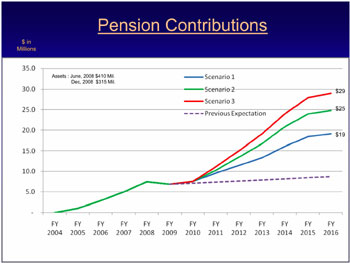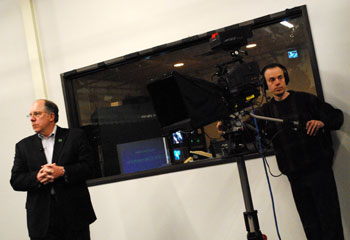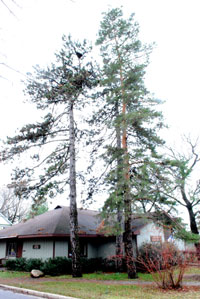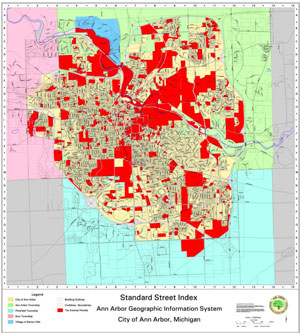Town Hall Begins Budget Conversation
In CTN studios on Tuesday night, the rain was falling audibly on the roof as the city administrator for Ann Arbor, Roger Fraser, used a town hall meeting format to present to the public his recommended budget for fiscal year 2010.
It included a plan for 2011, as well as the overall economic context for the budget. The presentation was essentially the same one he’d given to city council the previous evening, with the key difference being that he fielded questions from the public, instead of city councilmembers – several of whom were also on hand.
Fraser, accompanied also by Mayor John Hieftje, responded to a flood of questions ranging from the strictly clarificational (Why is there a significant increase in the city clerk’s budget from 2010 to 2011?), to requests for Fraser to talk about what the city was doing to curb costs in specific areas (Have you considered changing the city’s health care provider?), to criticism of particular cuts (This town can’t support a senior center?).
The studio had been set for around 35 people and all the chairs were filled. Of those attending, several spoke about the Ann Arbor Senior Center, which would close in the summer of 2010 as a part of the plan for fiscal year 2011. Currently it’s the budget for 2010 that’s at issue, but council will be adopting a plan for 2011 in the coming month – even though it won’t actually adopt the budget for 2011 until next year.
In light of the number of comments made by people about the senior center, that’s where we’ll start.
Ann Arbor Senior Center
Background: The closing of the Ann Arbor Senior Center in the summer of 2010 would save $141,000, according to the city’s summary of key implications for the FY 2011 budget. The center is located on Baldwin Avenue on the southeast edge of Burns Park.
Before this most recent discussion, the Ann Arbor Senior Center had barely made it onto The Chronicle radar. But it had, in fact, registered as a small blip in the context of a proposed petanque court in Burns Park. The east end of Burns Park – between the outdoor shelter and the road, and separated from the senior center’s location by a ball diamond – has been identified as the venue for the petanque court. When we touched based with park planning at the city on Wednesday, we learned they’re due to begin construction this spring as soon as contractors can be lined up. That construction is being funded through a private donation.
As we reported in November, the proximity to the senior center factored into the location of the petanque court, which is billed as a game that cuts across generations:
So why did Ando and Wilkinson choose Burns Park in Ann Arbor instead of a park in Ypsilanti, where they live, to offer their financial support of a petanque facility? It has to do with the fact that their vision is a bit more ambitious than a single petanque court in a single park. They’d like to see the sport really catch on in the region to the point where the facilities are more commonplace. And Burns Park, they said, seemed like a strategically good choice: it’s proximate to both the Ann Arbor Senior Center and Burns Park Elementary School, which brings a built-in geographic constituency.
The senior center calendar provides some idea of the range of activities there. When The Chronicle dropped by Wednesday morning, there was a fitness class in session that is not listed on the calendar. We met a couple of the seniors, one who drove herself, and the other who was a bus-riding enthusiast. They were setting up for lunch, but the food had not arrived yet. We learned that meals should be reserved two days in advance.
At the town hall, discussion of the proposed closing of the senior center led off with a resident who said he was astonished that the closing of the senior center had been included on a list that included the extension of road grating cycles and reduction of snow-removal overtime. He said that he’d been going to the senior center recently, and that many others did as well:
Some of them, quite frankly, are lonely. They have no friends who are still alive. They find their community there. The whole point is: it’s a community. It’s a group of people with similar interests and similar needs. And for those that are not as well endowed financially as others, you can get a good lunch there three times a week at a very reasonable rate [$2.50 for over 65 years, $5 under 65 years suggested donation.] I just don’t see how closing a senior center is anything like fixing the grading system, or putting something on an extra two-week cycle. … This is a major operation and it’s a facility – a social system that we desperately need. They’ve put in their time, they’ve paid their taxes in Ann Arbor – in my case for at least 40-odd years. And for someone to suggest that when I’m old enough to go there, that they now close down the senior center, treating it like Mack Pool, I find this astonishing!
That turn earned applause from around the room and a response from Fraser: “I understand your argument.”
Another resident contended that closing the senior center was short-sighted, because the population is aging, and there are going to be many more people whose needs could be served. Another resident who said she’d just moved here from New York lamented the fact that Ann Arbor was a city that apparently could support neither a local newspaper nor a senior center. [The Ann Arbor News recently announced that it was stopping publication in July 2009.]
Another resident objected that the senior center had been singled out, when there were other programs that could be considered. Responding to that objection, Mayor Hieftje offered the Leslie Science Center as an example of another program that he did not think could survive with the planned elimination of $30,000 from the FY 2010 budget for its support. [Leslie was spun off from the city as a private nonprofit with the intent that it would become financially independent of the city.] He described the science center as providing environmental education for kids from age 1.5 on up – a remarkable, one-of-a-kind facility. Later, one resident said he hated to see youth played against age in comparing the two facilities.
Other speakers asked specific questions. In some cases, we’ve followed up with city staff to try to pin down further details, and have indicated those gaps as “pending answers.”
- What will happen to the senior center programming? Fraser stressed that the closing is proposed for the second year of the plan. Built in to the proposal was the assumption that a year would be spent working out a transition for people who are involved at the senior center, Fraser said. Later, Hieftje contended that no decision needed to be made this year, because there was a year to work through the various issues. Fraser allowed that the network of people was something that could not be replicated with a strategy of finding alternate places for certain activities.
- What will happen to the senior center facility? Answers pending.
- Will there be a citizens committee involved in the transition work? Fraser said that if council were to decide to move forward with the closing, then his assumption was that there would be an advisory group that would work with staff on that transition. [The city's website indicates a Senior Center Advisory Board consisting of Dean Cole, Mary Hill, Lois Johnson, Lois Tiffany, Nancy Wiernik, Leona Yuerhs and Cecile Frogh.]
- Wasn’t the land for the center donated specifically for a senior center? At the meeting, there were no definitive answers, although Hieftje said his recollection was that there was a connection to the Ann Arbor Public Schools system. [Online archives of council minutes show that on October 2, 2000, city council voted to take over the management of the senior center from the school system, citing the financial difficulty of the school system. On June 3, 2002, council voted to establish the advisory board for the center. A history of the center written in 1985 by a University of Michigan student, Diane Crane, traces the history of the structure as a barn for the horse races in Burns Park, but does not – as far as The Chronicle can discern – include a bequest stipulating the land be used for a senior center.] Answers pending.
- What about the $100,000 gift that was made to the center? At the meeting there was some uncertainty regarding the possibility that the Ann Arbor Area Community Foundation might be administering the gift. [This confusion could be due to the fact that James Harmon Flinn, Jr. bequeathed two gifts of $100,000 – one to the Ann Arbor Area Community Foundation and another to the Ann Arbor Senior Center.] Answers pending.
City staff are currently putting together, for publication on the city’s website, the figures on expenses and revenues (class fees and renting out of space) that yield the projected $141,000 cost savings. Further, they’re getting numbers on annual usage of the facility. We’ll update as that information is available.
Other Questions on the Budget
Some of the questions asked by the public included the following:
Q: Why is there a jump in the clerk’s budget from FY 2010 to FY 2011 [$885,960 to $1,039,966]? Fraser noted that biennial elections are more expensive to administer than off-year elections.
Q: Is there benchmark data available from other communities so that we can assess if we’re getting adequate bang for our buck? Fraser said he’d worked in three different states and six different communities and that what he’d seen is that each community has unique expectations for service levels and that services and amenities tend to reflect the values of the community.
Q: Isn’t 746 city employees in a city of roughly 120,000 people still too high? Should we think about cutting more positions? Fraser said that nationwide the average ratio of city workers to population was around 1/100.
Q: What is the commitment to regional cooperation in the area of parks? Isn’t this the perfect time to push for it? Fraser said that to date most of the collaboration countywide had been with trails, not an entire district. They’d continue to push for regional cooperation wherever it was possible.
Q: Have you explored reducing health care costs by using a different provider? Yes. Fraser described the self-insured system that the city uses, which is administered by Blue Cross Blue Shield. He said that by design, the eight different bargaining units at the city had their contracts expire at the same time in 2006 so that they could be negotiated all at the same time. Part of the health care plan involves incentives, whereby if an employee’s health care costs increase beyond a certain amount, they forfeit a percentage of a possible pay increase. Conversely, if their health care costs are less, then they’re eligible for greater pay increases than they would otherwise get. Hieftje noted that for retirees, it’s not possible to affect the health care costs in the same way.

The red line reflects the least optimistic scenario – one in which the auto industry collapses. (Images links to higher resolution file.)
Q: In light of the direst of the scenarios sketched out – which would require a much greater contribution to the pension fund – how would we manage that? Have you considered looking at a defined contribution? Fraser said that looking at 2016, it’s not possible to continue the way we’re currently making contributions. In response to the suggestion of an income tax, Fraser said that as a city that has 70% of its workers come in to work, that Ann Arbor was ripe for an income tax. He noted that the city could not collect both a property tax and an income tax and that an income tax would be limited to 1% for city residents and .5% for non-resident workers with jobs inside the city.
Fraser added that it was not his decision to make. Hieftje, for his part, said he’d never been a fan of a city income tax, citing his belief that renters would not see landlords’ cost savings passed on to them.
Q: In light of the fact that sales tax revenues are down 19%, is the assumption of no decrease in state shared revenue realistic? Shouldn’t we assume a downward trend? Fraser allowed that they listed the projection as a risk. But in the past, he said, they’d assumed a downward trend despite assurances from the state that they were committed to stable levels, and the downward trend had not be borne out. This time, Fraser said, they were taking assurances from the state to be accurate forecasts.
Q: Have you discussed the maintenance of training schedules in crisis intervention for law enforcement officers? This, in light of the fact that as many as 5-10% of calls to police are people with brain disorders and in light of the multiplying effect of burdens on jail facilities, which can trigger crowding and early release, which can repeat the cycle. Frase said that they were committed to continued professional training.
Q: Are non-union employees taking a pay cut? Fraser said that non-union employees had accepted that there won’t be increases, but that there’s only so far you can take that.
Replay Schedule of Town Hall on CTN
Online, the tape of the town hall budget meeting will be available through CTN’s video-on-demand. The replay schedule on CTN channel 16 will be:
- Friday, April 17 at 10 a.m.
- Saturday, April 18 at 9 a.m.
- Monday, April 20 at 10 a.m.
- Thursday, April 23 at 1 p.m.
- Saturday, April 26 at 7 p.m.
The timeline for the budget’s adoption will include public hearings on May 4, with council adopting a budget with any amendments on May 18. If council fails to act on the budget or to amend it by its second meeting in May, then per the city charter, the budget as submitted by the city administrator is automatically adopted.
The park advisory commission will hold a public hearing next Tuesday, April 21, on the recommendations related to parks, before voting on its recommendation.







The long term problem that no one wants to talk about is that just like the US auto companies which are little more than a glorified pension/health plan with an auto company coincidentally attached to it, due to the promises made to past and current employees, municipal governments are also becoming pension plans that happen to also have some governmental responsibility. This problem is just starting to surface and is being magnified by an eroding tax base. Until municipalities either switch to defined contribution plans or the citizens agree to be taxed to support these obligations, municipal budgets will die a death of a thousand cuts…..
Thank you once again for getting the word out. Burying the closing of the senior center in discussion of road grading and snow removal overtime is no accident. We were not meant to know about it until it was done. I hope this generation of seniors, raised with a history of civic involvement, will not sit back and let it happen.
Agreed, Barbara, about burying the info about the Senior Center. And even MORE buried is the cutting off funding to the Leslie Science and Nature Center, and Project Grow! Seriously, these are the things that make Ann Arbor worth being here…. and that support community here, which we need now more than ever. I am so disheartened.
Exactly how was this buried? The cuts for the senior center and Leslie science center will not take place for a year. The intensity of your responses makes it seem like this is being voted on next week.
I think a year is plenty of time to discuss these issues. The city explained this issue at a public townhall where they gave ample notification.
You might not like what they are proposing for the 2011 budget, but I have not seen the city try to to hide the budget cuts. That is just rheteric.
For those interested in these issues, make a case for it and present it to the public and city council. You have a year.
OK, fair enough. I guess I just feel like these cuts are so egregious and upsetting that I would expect something plastered across the front page of the Ann Arbor News, with subsequent letters to the editor, etc.